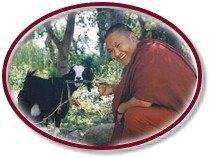|
The Dalai Lama's noble action is an inspiration to people around the world and is especially admirable because he changed his diet at the age of seventy.Actually, he had wished to be vegetarian from an early age but was hindered by the curious beliefs of his personal physicians.
Nowadays, however, Tibetan doctors increasingly recognize the benefits of vegetarianism, including Dr. Tenzin Tsephal, Director of Tibetan Medicine in one of the main Tibetan expatriate settlements, who states, “It is not necessary for [the Dalai Lama] to eat meat. I would never prescribe someone to start eating meat again. The Tibetan doctors who do so are a bit old-fashioned and aren't aware [of] or open to the alternatives to eating meat. I think all Tibetans can and should stop eating meat.”
In 2004, Kentucky Fried Chicken announced plans to open chicken restaurants in Tibet, and in response the Dalai Lama issued the following public appeal: “On behalf of my friends at People for the Ethical Treatment of Animals (PETA), I am writing to ask that KFC abandon its plan to open restaurants in Tibet because your corporation's support for cruelty and mass slaughter violate Tibetan values.” Thereafter, the KFC management abandoned its plans.
Before this event, the Dailai Lama had conducted many other vegetarian campaigns. For example, in 1993, he asked restaurants in Dharamsala, India, home of the world's largest Tibetan exile community, to become vegetarian so that Tibetans could experience delicious vegetarian food and learn how to stop eating meat. As a result, several local residents became vegetarian, and because of these restaurants vegetarian foods such as tofu have become known to the Tibetan public.
Another Tibetan Vegetarian Pioneer
Another true vegetarian hero from Tibet is the monk Geshe Thupten Phelgye, who, after practicing in retreat for several years, founded the Universal Compassion Movement, ( www.universalcompassion.org ) in 1998. The Movement promotes vegetarianism and compassion for all sentient beings through various means, including distributing vegetarian flyers around Dharamsala. |

Geshe Thupten Phelgye
|
In 1999, Phelgye was elected president of the International Gelug Society, which represents the major monastic tradition in Tibet, and managed to pass a resolution that all residents of Gelug monasteries and nunneries become vegetarian. The following year, the Gelug monks elected him their representative in the Tibetan Parliament In-Exile in Dharamsala, where he proposed a historic law declaring 2004 the Tibetan Vegetarian Year, during which all Tibetans would be required to be vegetarian. The Parliament subsequently passed the law, whereby vegetarianism was encouraged but not enforced, bringing vegetarianism to the forefront of Tibetans' minds. This ruling may be considered the greatest such law since the Ashokan Edict of 200 B.C., which established vegetarianism in India.
|